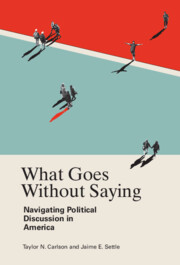
-
Select format
-
- Publisher:
- Cambridge University Press
- Publication date:
- May 2022
- June 2022
- ISBN:
- 9781108912495
- 9781108831864
- 9781108927444
- Dimensions:
- (229 x 152 mm)
- Weight & Pages:
- 0.6kg, 318 Pages
- Dimensions:
- (229 x 152 mm)
- Weight & Pages:
- 0.471kg, 318 Pages
You may already have access via personal or institutional login
Book description
Why are political conversations uncomfortable for so many people? The current literature focuses on the structure of people's discussion networks and the frequency with which they talk about politics, but not the dynamics of the conversations themselves. In What Goes Without Saying, Taylor N. Carlson and Jaime E. Settle investigate how Americans navigate these discussions in their daily lives, with particular attention to the decision-making process around when and how to broach politics. The authors use a multi-methods approach to unpack what they call the 4D Framework of political conversation: identifying the ways that people detect others' views, decide whether to talk, discuss their opinions honestly—or not, and determine whether they will repeat the experience in the future. In developing a framework for studying and explaining political discussion as a social process, What Goes Without Saying will set the agenda for research in political science, psychology, communication, and sociology for decades to come.
Reviews
‘The nature of democratic discourse is one of the most studied topics in the social sciences – and for good reason since it plays a large role in determining how democracies function. Yet, existing work has almost completely ignored the fundamental question of why people talk about politics in the first place. The authors make a seminal contribution by detailing the processes that drive political discussions or lack thereof. Their framework, which accentuates how social processes shape political interactions, will guide thinking for generations to come.'
James N. Druckman - Payson S. Wild Professor of Political Science and Faculty Fellow at the Institute for Policy Research, Northwestern University
‘Carlson and Settle bring together several strands of research that have been percolating over the past decade or so; then, they advance our state of understanding by bringing these strands into conversation with one another. With their 4D Framework, a more coherent and ultimately useful perspective on informal political discussion has emerged. These insights highlight new questions and directions for research and raise a cautionary note about broad and undifferentiated calls for more talk as a salve for American democracy.’
William P. ‘Chip’ Eveland Jr. - Professor of Communication, The Ohio State University
‘Carlson and Settle brilliantly situate political discussion in the context where it actually happens - which is often the places where it is neither expected nor desired. The authors carefully weave classic theories of interpersonal conflict with novel insights about how both group dynamics and individual traits shape the unanticipated origins and often uncomfortable impact of every-day political chit-chat. Using cutting-edge techniques, these authors provide the clearest picture to date on the strain that political discussions pose on the public and the rationale behind America’s trepidation toward talking about politics.’
Samara Klar - The University of Arizona, co-author of Independent Politics
‘Carlson and Settle provide the most comprehensive framework for understanding political discussion. Their framework integrates insights from neuroscience, network science, and many other disciplines. They show the value of this framework using innovative survey research paired with biometric feedback and creative experimental designs.’
Matthew T. Pietryka - Florida State University, co-author of Examining Motivations in Interpersonal Communication Experiments
Contents
Metrics
Altmetric attention score
Full text views
Full text views help Loading metrics...
Loading metrics...
* Views captured on Cambridge Core between #date#. This data will be updated every 24 hours.
Usage data cannot currently be displayed.
Accessibility standard: Unknown
Why this information is here
This section outlines the accessibility features of this content - including support for screen readers, full keyboard navigation and high-contrast display options. This may not be relevant for you.
Accessibility Information
Accessibility compliance for the PDF of this book is currently unknown and may be updated in the future.


